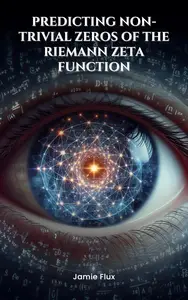
Free Download End-to-End Differentiable Architecture: Predicting Non-Trivial Zeros of the Riemann Zeta Function by Jamie Flux
English | November 13, 2024 | ISBN: N/A | ASIN: B0CZJ431DQ | 208 pages | PDF | 4.52 Mb
Delve into the cutting-edge intersection of advanced mathematics and deep learning with this comprehensive exploration of neural networks applied to one of the most profound challenges in mathematical theory-the prediction of the non-trivial zeros of the Riemann Zeta Function. This seminal work bridges the gap between abstract mathematical concepts and practical computational techniques, offering innovative methodologies that push the boundaries of current knowledge in both mathematics and artificial intelligence.
Structured into thirty-three meticulously crafted chapters, the book guides readers through a journey starting from fundamental concepts to highly sophisticated approaches. It begins with the encoding of complex analysis directly into neural network architectures, allowing for the manipulation of complex variables inherent in the zeta function. The exploration continues into designing neural models capable of handling infinite domain functions and highly oscillatory behaviors, essential for accurately modeling the zeta function's intricate properties.
Key features include:
* Complex-Valued Neural Networks: Delve into fully complex-valued neural networks where weights, biases, activations, and outputs are complex numbers, enabling the modeling of functions that are holomorphic in nature.
* Custom Loss Functions: Learn about loss functions specifically tailored to the unique analytic properties of the Riemann Zeta Function, incorporating critical aspects like the functional equation and symmetry about the critical line.
* Integration of Advanced Mathematical Theories: Explore the incorporation of differential geometry, wavelet analysis, spectral methods, and cohomology theory into neural network design for a more natural and efficient function approximation.
* Innovative Neural Architectures: Discover architectures such as symmetry-aware networks, equivariant networks, and quantum-inspired neural networks that respect the inherent symmetries and properties of mathematical functions.
* Advanced Training Techniques: Gain insights into training methodologies for highly oscillatory functions, regularization techniques to prevent overfitting, and optimization on manifold spaces to ensure stable and efficient convergence.
* Adaptive Learning Approaches: Investigate meta-learning, reinforcement learning, and unsupervised learning techniques that enhance model adaptability and enable the discovery of hidden patterns within complex functions.
* Uncertainty Quantification: Understand the use of Bayesian neural networks for quantifying uncertainty in predictions, providing confidence intervals crucial for mathematical conjectures.
This authoritative text is an indispensable resource for researchers, practitioners, and advanced students at the forefront of mathematics, computer science, and artificial intelligence. It not only presents groundbreaking theoretical constructs but also provides practical implementation strategies, complete with detailed mathematical formulations and hands-on examples. Whether your goal is to deepen your understanding of the Riemann Zeta Function, apply neural networks to complex mathematical problems, or explore future directions in deep learning architectures, this book offers profound insights and a wealth of knowledge that will contribute significantly to your work and the field at large.
